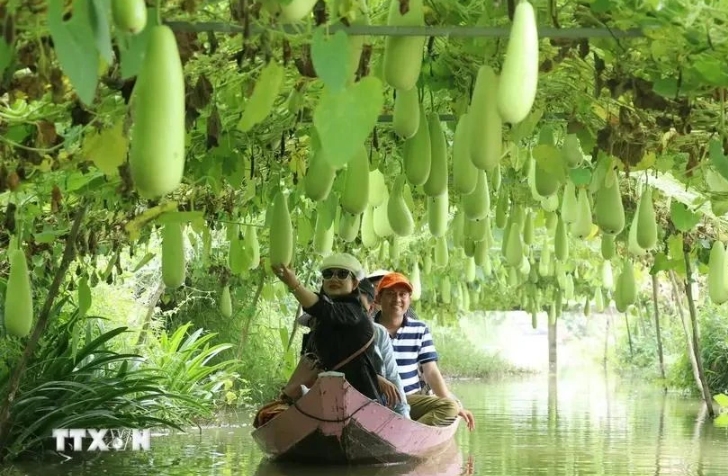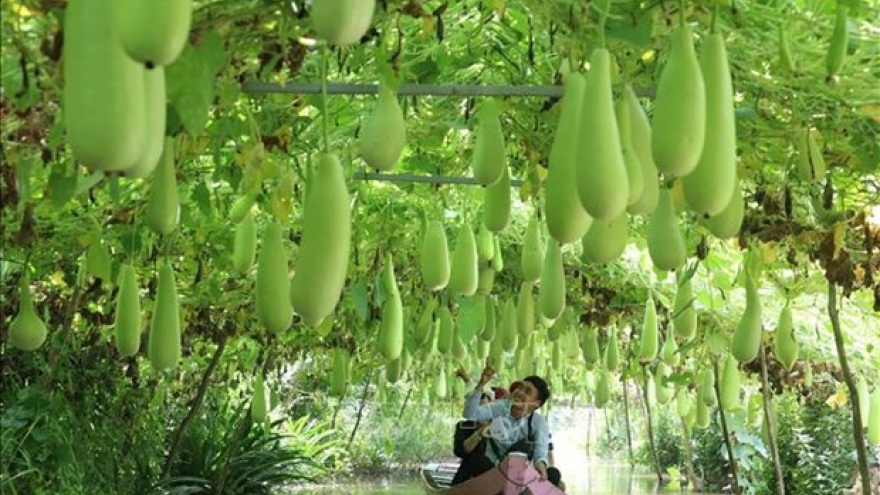Agritourism needs opportunities to “take off”
Vietnam, with its developed agriculture, holds huge potential to development rural and agricultural tourism. However, this type of tourism has yet to receive appropriate attention, and is still waiting for suitable policies and right opportunities to “take off”, insiders have said.

Tran Tu Huong's family, from Hanoi’s Hai Ba Trung district, often takes their children on trips to explore the outskirts of the capital city at the weekend. In their daily life, the adults are busy with work, and the children are caught up with regular school and extra lessons, so the family only has time together at the weekend. Therefore, day trips or one-night getaways are their favourite activities to strengthen family bonds, relax, and recharge for the upcoming week.
Eco-tourism in rural areas is becoming increasingly popular. Agricultural and rural tourism trends are not only growing in countries around the world, but they are particularly well-suited to Vietnam – a country with vast agricultural land and a population where more than 62.7% live in rural areas.
According to tourism expert Nguyen Quang Dang at the Institute for Tourism Development Research, rural tourism is a unique form of travel that blends cultural experiences with the natural environment. This type of tourism encompasses a variety of activities, services, and amenities provided by local farmers and rural communities to attract and serve visitors. It includes farm tourism, agricultural tourism, craft village tours, festival tourism, and ecotourism.
Rural tourism offers visitors a chance to engage in activities like fishing in ponds, picking tea leaves and roasting them into tea, or grinding rice to make rice rolls. These hands-on experiences add a deeper, more meaningful layer to the travel experiences, said Dang.
In the programme on rural tourism development in new-style rural area building in the 2021–2025 period, approved by the Prime Minister on August 2, 2022, the development of rural tourism is identified as one of the key solutions of the national target programme on building new-style rural areas in this period.
In Vietnam, the development of tourism is closely linked to the modernisation of rural areas. Modern rural infrastructure, including services for accommodation, sanitation and food safety, provides a foundation for the growth of rural tourism. In turn, rural tourism contributes to increasing household incomes, improving livelihoods, and boosting the consumption of local products, thereby supporting the local economy and enhancing the quality of the new-style rural area building.
Dr. Pham Huong Trang, a lecturer in Tourism and Hospitality Management at RMIT University, emphasised that for agritourism to develop effectively, it is essential to have well-established service spaces such as farms, fruit orchards, traditional craft villages with cultural values, local festivals, and unique culinary experiences.
She particularly highlighted the importance of the local community's involvement. As the group most closely connected to the cultural environment and production methods, local people play a crucial role in preserving and sharing cultural values with tourists. They become the custodians of agricultural heritage, helping to spread these values and creating a distinctive travel experience.
In addition, to effectively develop this form of tourism, localities should integrate the "One Commune, One Product" (OCOP) programme with community-based tourism services and tourist destinations, Trang stated, adding that each tourism site should have a comprehensive development plan based on natural resources, cultural heritage, and local values found in villages, communes, or hamlets.
At the same time, creating shared tour routes and coordinating communication and promotional activities between localities can help enhance the appeal of rural tourist destinations, she stressed.


